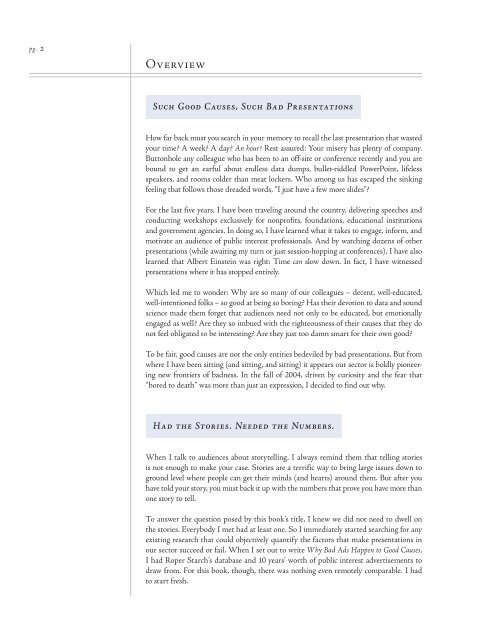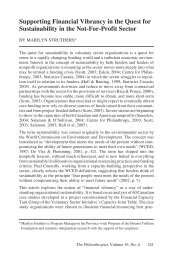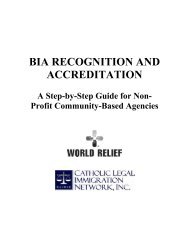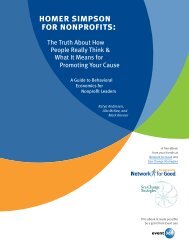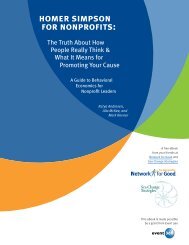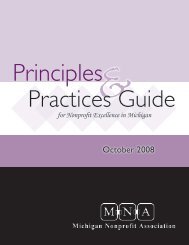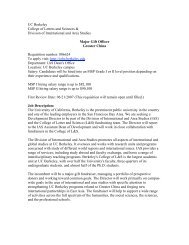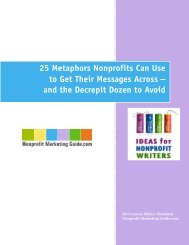Why Bad Presentations Happen to Good Causes - The Goodman ...
Why Bad Presentations Happen to Good Causes - The Goodman ...
Why Bad Presentations Happen to Good Causes - The Goodman ...
Create successful ePaper yourself
Turn your PDF publications into a flip-book with our unique Google optimized e-Paper software.
pg. 2<br />
Overview<br />
Such <strong>Good</strong> <strong>Causes</strong>, Such <strong>Bad</strong> <strong>Presentations</strong><br />
How far back must you search in your memory <strong>to</strong> recall the last presentation that wasted<br />
your time? A week? A day? An hour? Rest assured: Your misery has plenty of company.<br />
But<strong>to</strong>nhole any colleague who has been <strong>to</strong> an off-site or conference recently and you are<br />
bound <strong>to</strong> get an earful about endless data dumps, bullet-riddled PowerPoint, lifeless<br />
speakers, and rooms colder than meat lockers. Who among us has escaped the sinking<br />
feeling that follows those dreaded words, “I just have a few more slides”?<br />
For the last five years, I have been traveling around the country, delivering speeches and<br />
conducting workshops exclusively for nonprofits, foundations, educational institutions<br />
and government agencies. In doing so, I have learned what it takes <strong>to</strong> engage, inform, and<br />
motivate an audience of public interest professionals. And by watching dozens of other<br />
presentations (while awaiting my turn or just session-hopping at conferences), I have also<br />
learned that Albert Einstein was right: Time can slow down. In fact, I have witnessed<br />
presentations where it has s<strong>to</strong>pped entirely.<br />
Which led me <strong>to</strong> wonder: <strong>Why</strong> are so many of our colleagues – decent, well-educated,<br />
well-intentioned folks – so good at being so boring? Has their devotion <strong>to</strong> data and sound<br />
science made them forget that audiences need not only <strong>to</strong> be educated, but emotionally<br />
engaged as well? Are they so imbued with the righteousness of their causes that they do<br />
not feel obligated <strong>to</strong> be interesting? Are they just <strong>to</strong>o damn smart for their own good?<br />
To be fair, good causes are not the only entities bedeviled by bad presentations. But from<br />
where I have been sitting (and sitting, and sitting) it appears our sec<strong>to</strong>r is boldly pioneering<br />
new frontiers of badness. In the fall of 2004, driven by curiosity and the fear that<br />
“bored <strong>to</strong> death” was more than just an expression, I decided <strong>to</strong> find out why.<br />
Had the S<strong>to</strong>ries. Needed the Numbers.<br />
When I talk <strong>to</strong> audiences about s<strong>to</strong>rytelling, I always remind them that telling s<strong>to</strong>ries<br />
is not enough <strong>to</strong> make your case. S<strong>to</strong>ries are a terrific way <strong>to</strong> bring large issues down <strong>to</strong><br />
ground level where people can get their minds (and hearts) around them. But after you<br />
have <strong>to</strong>ld your s<strong>to</strong>ry, you must back it up with the numbers that prove you have more than<br />
one s<strong>to</strong>ry <strong>to</strong> tell.<br />
To answer the question posed by this book’s title, I knew we did not need <strong>to</strong> dwell on<br />
the s<strong>to</strong>ries. Everybody I met had at least one. So I immediately started searching for any<br />
existing research that could objectively quantify the fac<strong>to</strong>rs that make presentations in<br />
our sec<strong>to</strong>r succeed or fail. When I set out <strong>to</strong> write <strong>Why</strong> <strong>Bad</strong> Ads <strong>Happen</strong> <strong>to</strong> <strong>Good</strong> <strong>Causes</strong>,<br />
I had Roper Starch’s database and 10 years’ worth of public interest advertisements <strong>to</strong><br />
draw from. For this book, though, there was nothing even remotely comparable. I had<br />
<strong>to</strong> start fresh.


